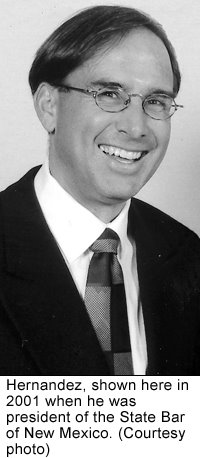In the housing authority case, the allegations against the former head of the state bar are much different than the charges against the other defendants
Three men indicted Friday in the housing authority case face felony charges including fraud and money laundering that could land them in prison for decades if they’re convicted.
But the fourth defendant in the case, an Albuquerque attorney and former head of the State Bar of New Mexico, faces a much different allegation — that he destroyed, changed, fabricated or hid two invoices and a promissory note with the intention of preventing the apprehension, prosecution or conviction of himself or someone else.
David N. Hernandez, who was a contract attorney for the Region III Housing Authority, is charged with one count of tampering with evidence, according to the indictment. It’s a fourth-degree felony that carries a maximum prison sentence of 18 months.
While tampering with records may not carry as long a prison sentence as the charges against the other defendants, it’s an important part of the housing authority case. The allegations in the case center on the misuse of millions of dollars in bond money, and officials have complained for years that the investigation was hampered by the high volume of missing documentation.
Some officials have said they believe someone destroyed government documents related to the case, while others say it’s not clear whether the documents were destroyed, taken or simply not created in the first place.
No one but Hernandez has been charged with tampering with records in the case. The attorney general’s office isn’t commenting, so whether additional charges against Hernandez or others are forthcoming isn’t known.
Hernandez’s attorney, Ryan Villa, says his client is innocent. He pointed out in an interview that Hernandez is accused of tampering with three documents, not the volume of missing records officials have complained about. And he said conviction on the tampering with evidence charge requires proof that there was specific intent to evade prosecution or obstruct justice.
“I think the government’s going to have a very difficult time proving David did anything with the intent to evade prosecution or to obstruct justice,” Villa said.
Hernandez ‘served with distinction’
Villa defended his client as an “upstanding citizen” and a “well-respected attorney,” referring to his service as head of the state bar association in 2001.
“You don’t get that kind of job or that kind of appointment without being well-respected in the legal community,” Villa said.
Las Cruces attorney Mary Torres, who followed Hernandez as president of the state bar in 2002, said in a statement released by the organization that Hernandez “served the state bar well as president and served with distinction,” and said he was “very active, reaching out to local and voluntary bar associations.”
“He is innocent until proven guilty, and I believe he will be grateful for the opportunity to respond to the allegations,” Torres said. “The justice system will be fair.”
An employee with the state Supreme Court’s disciplinary board said Hernandez has never been disciplined for misconduct in his position as an attorney.

